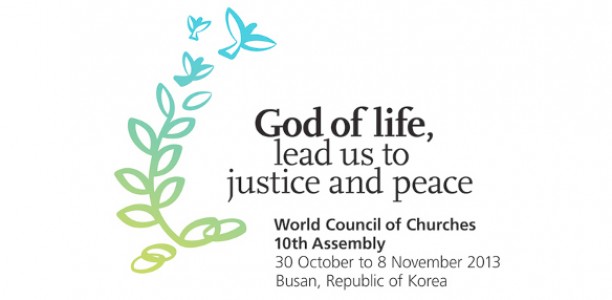
By Father Tom Ryan
Often, people look at church congregations and meetings and wonder, “Where are the youth?”
But at the World Council of Churches 10th Assembly in Busan, young people are everywhere.
In addition to the more than 700 youth delegates, young adult volunteers in orange shirts are positioned at entryways and along the corridors, offering program materials, giving directions and answering questions.
“They represent the future, and it’s thanks to them that this assembly is functioning so well,” said the Rev. Ofelia Ortega Suarez, a Cuban Presbyterian and former WCC officer.
Another 150 young adults in the assembly hall and worship space wear white shirts with “stewards” written across the back in big green letters. They come from around the world to give their time and energy to assist the assembly in its work, but also to share in an experience of ecumenical formation and to strengthen the voice of youth at the sessions.
Young people go in and out of the Justice and Peace Tent in Madang hall, the assembly’s social gathering area, talking about what they have just heard in a plenary session. Other students are taking part in the Korean Ecumenical Theological Institute. Participation in different assembly events is part of the learning experience for them all.
The WCC’s Global Ecumenical Theological Institute brought together 180 seminarians and faculty from all regions of the world and all Christian denominational traditions for an intensive two-week theological program on “the future of ecumenism and the transformation of World Christianity in the 21st century.”
Diedrich Werner, global program coordinator for the institute, said he believes “younger potential leaders need to have an ecumenical vision of the church. Those enrolled are not only from WCC member churches. We have also included Roman Catholics, both among the students and faculty. It’s a truly ecumenical gathering.”
He said the program includes internationally known scholars addressing the students, “so it is an intergenerational dialogue between ecumenical leaders in world Christianity and the young adults.”
Victor Cancino of Boston is a Jesuit in training.
“Before my experience here,” he said, “I was more interested in dialogue with other religions than in the work for Christian unity. However, coming to this assembly has been life-changing, because it’s made me see the diversity of the Christian experience in its broad range of traditions.
“Getting to know and share with people from other traditions of Christian faith also makes our divisions less acceptable,” he said. “So now this idea of unity within the church and what that might look like holds new interest and value for me.”
Karin Gerstle, a member of the United Protestant Church of France, has a Protestant mother and a Catholic father. She said her experience in Busan “has opened my eyes and heart. I am now thinking of going on for a Ph.D. in ecumenical studies. My own commitment to work for Christian unity is deepening because of what I’m living here.”
Sarah Thompson is a Mennonite Anabaptist from Indiana who has worked with Christian Peacemaker Teams in the U.S., Canada, the Holy Land, Iraq and Columbia. She said she has appreciated the opportunity to “reflect and theologize with people from around the world.”
“The prayer and discussions taking place here will inform my action,” she said.
Sai Hyung Lee, a member of the Presbyterian Church of Korea, shared how he finds his own faith being enriched in the assembly and the theological institute.
“Meeting people from all these diverse contexts is making me broaden my prayers and my thoughts, and to care about all the people in this world, not just those of my own country,” he said. “It’s also giving me a network of people in diverse churches with whom I hope to join hands in the work for justice and peace as we go forward from here.” – CNS